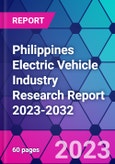EVIDA LAW INCENTIVIZES DEVELOPMENT OF EV INDUSTRY: In April 2022, the Philippines passed the Electric Vehicle Industry Development Act (EVIDA, Republic Act 11697).The passage of the EVIDA is in line with Philippine policies that seek to ensure the country's energy security and independence by reducing the transportation sector's dependence on imported fuels. The passage of the Act helps the Philippine EV industry to develop more granular guiding regulations to facilitate private sector participation in a level and non-discriminatory playing field. Under the EVDA, all electric and hybrid vehicles will be issued a special EV license plate and will be entitled to tax exemptions. Under the TRAIN Act, also known as the Tax Reform for Acceleration and Inclusion Act (TRAIN), fully battery-powered vehicles will be exempted from 100 percent of the excise tax, while hybrids powered by both fuel and batteries will be exempted from 50 percent of the excise tax.
Import tariff reduction to boost electric vehicle import growth in the Philippines: the Philippine National Economic and Development Authority (PNEDA) passed an executive order on November 24, 2022 that will reduce tariffs on several imported electric vehicles and parts in early 2023. At that time, the authority will temporarily withdraw tariffs on imported EVs for a period of five years, but will not apply to hybrid vehicles. The current 5 percent tariff on electric vehicle parts will be reduced to 1 percent within the same period.
The Philippines' Department of Transportation (DOTr) is implementing a Public Utility Vehicle (PUV) Modernization Program, a massive transportation initiative that calls for the phasing out of jeepneys (World War II-era jeepneys converted to public transportation) that are at least 15 years old and replacing them with environmentally friendly alternatives. The replacements can be Euro 4 compliant vehicles or electric vehicles. There are nearly 180,000 jeeps in the country that need to be replaced, and the electric vehicle industry is aiming to meet 10 percent of this potential demand.
From 2020-2022, electric vehicle sales in the Philippines are growing year-on-year, with a CAGR of 63.70% from 2020-2022, according to the analysis. In 2020, only 378 electric vehicles will be sold in the Philippines, and by 2022, this number grows to 1,013, a year-on-year increase of 20.17%.
The analyst expects the sales volume of Philippine's EV to reach 150,800 units in 2032, growing at a CAGR of 59.7% from 2023-2032.
The Philippine electric vehicle market is expected to see rapid growth in the next few years, and the analyst anticipates that the Philippine electric vehicle supporting facilities industry, such as charging piles and charging stations, will also see many investment opportunities.
Topics covered:
- Overview of the Electric Vehicle Industry in the Philippines
- Economic and Policy Environment of the Philippine Electric Vehicle Industry
- What is the impact of COVID-19 on the Philippine electric vehicle industry?
- Philippines Electric Vehicle Industry Market Size, 2023-2032
- Analysis of Major Philippine Electric Vehicle Industry Manufacturers
- Key Drivers and Market Opportunities in the Philippine Electric Vehicle Industry
- What are the key drivers, challenges and opportunities for the Electric Vehicles industry in the Philippines during the forecast period 2023-2032?
- Which are the key players in the Philippines Electric Vehicle Industry market and what are their competitive advantages?
- What is the expected revenue of the Electric Vehicle Industry market in Philippines during the forecast period of 2023-2032?
- What strategies have been adopted by the key players in the market to increase their market share in the industry?
- Which segment of the Philippines electric vehicle industry market is expected to dominate the market by 2032?
- What are the major unfavorable factors facing the electric vehicle industry in the Philippines?
Table of Contents
Companies Mentioned
- Jaguar
- Changan
- BYD
- Nissan
- Tojo Motors
- Honda
- BMW
- KYMCO
- Lexus
- Toyota
Methodology
Background research defines the range of products and industries, which proposes the key points of the research. Proper classification will help clients understand the industry and products in the report.
Secondhand material research is a necessary way to push the project into fast progress. The analyst always chooses the data source carefully. Most secondhand data they quote is sourced from an authority in a specific industry or public data source from governments, industrial associations, etc. For some new or niche fields, they also "double-check" data sources and logics before they show them to clients.
Primary research is the key to solve questions, which largely influence the research outputs. The analyst may use methods like mathematics, logical reasoning, scenario thinking, to confirm key data and make the data credible.
The data model is an important analysis method. Calculating through data models with different factors weights can guarantee the outputs objective.
The analyst optimizes the following methods and steps in executing research projects and also forms many special information gathering and processing methods.
1. Analyze the life cycle of the industry to understand the development phase and space.
2. Grasp the key indexes evaluating the market to position clients in the market and formulate development plans
3. Economic, political, social and cultural factors
4. Competitors like a mirror that reflects the overall market and also market differences.
5. Inside and outside the industry, upstream and downstream of the industry chain, show inner competitions
6. Proper estimation of the future is good guidance for strategic planning.

LOADING...
Table Information
| Report Attribute | Details |
|---|---|
| No. of Pages | 60 |
| Published | August 2023 |
| Forecast Period | 2023 - 2032 |
| Estimated Market Value in 2023 | 2.2 Thousand Units |
| Forecasted Market Value by 2032 | 150.8 Thousand Units |
| Compound Annual Growth Rate | 59.7% |
| Regions Covered | Philippines |
| No. of Companies Mentioned | 10 |









